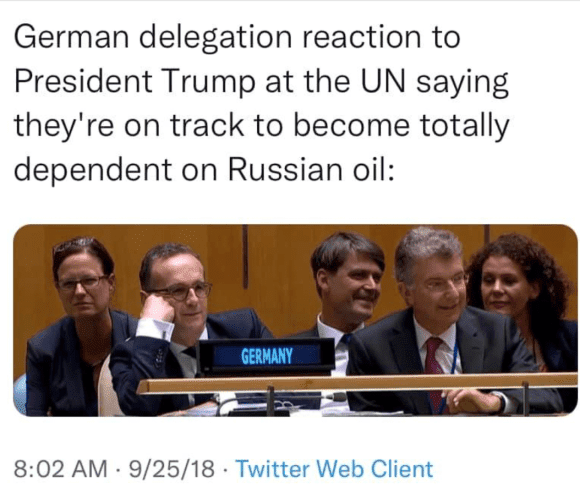BY STEVEN HAYWARD | POWERLINE
Matt Ridley reported on this at length back in 2019 in “The
Plot Against Fracking.” Key part:
The Russians also lobbied behind the scenes
against shale gas, worried about losing their grip on the world’s gas supplies.
Unlike most conspiracy theories about Russian meddling in Western politics,
this one is out there in plain sight. The head of Nato, Anders Fogh Rasmussen,
said the Russians, as part of a sophisticated disinformation operation,
“engaged actively with so-called non-governmental organisations — environmental
organisations working against shale gas — to maintain Europe’s dependence on
imported Russian gas”.
The Centre for European Studies found that
the Russian government has invested $95 million in NGOs campaigning against
shale gas. Russia Today television ran endless
anti-fracking stories, including one that “frackers are the moral equivalent of
paedophiles”. The US Director of National Intelligence stated that “RT
runs anti-fracking programming … reflective of the Russian Government’s concern
about the impact of fracking and US natural gas production on the global energy
market and the potential challenges to Gazprom’s profitability.” Pro-Russian
politicians such as Lord Truscott (married to a Russian army colonel’s
daughter) made speeches in parliament against fracking.
Ridley goes on to trace out how David Cameron’s
conservative government a decade ago buckled under the public pressure, and
killed a nascent natural gas production industry in Britain. The Russians
were also behind successful anti-fracking campaigns in several eastern
European countries, such as Bulgaria (I learned about this first hand in two
trips to Bulgaria I made several years ago).
And here we are. Daniel Yergin has some useful thoughts
on the scene in his interview this weekend with Andrew Ross Sorkin at the New
York Times:
Sorkin: How did we get here?
Yergin: I think people just forgot
about energy security. As the U.S. went from importing 60 percent of our
oil to becoming an exporter, we then didn’t think about it anymore. What
we’ve had recently is somewhat shortsighted policies about investment. And the
term I’ve been using is “pre-emptive underinvestment” in developing new
resources. Oil demand is still increasing and is likely to increase at least
for the rest of this decade and perhaps into early next decade.
Sorkin: How much of that is a function of the
move toward greener energy?
Yergin: There is a paper written by an economist, Jean Pisani-Ferry,
from a macroeconomic point of view, saying if you try and move too fast
it’s going to be quite disruptive. And he wrote that in August, and it sort
of seemed like an interesting paper. And then this energy crisis in Europe began before Putin put the brakes on deliveries of gas last October. It
was also just within the last month that Germany closed down its last two
nuclear power plants. And so that meant importing more gas.
Yergin is being typically diplomatic. If you read between
the lines, it’s clear he is saying our policy makers both here and in Europe
are idiots.
Chaser:


